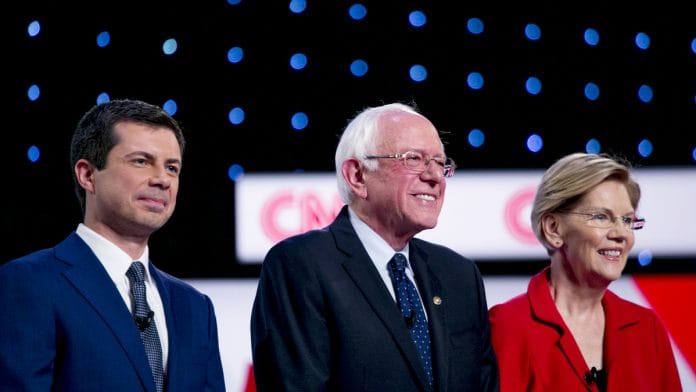New Delhi: This has been an important week for the Democratic Party as 20 of its candidates competing for the nomination to challenge US President Donald Trump in November 2020 elections participated in two debates.
At present, there are 24 Democratic challengers. So far, just one Republican is running against Trump.
Six women, which is a record number, and a few non-white candidates are in the race for the White House this time. They include Indian-American Kamala Harris. ThePrint takes a look at the prominent candidates, their stand on issues, and some other aspects.
Debates with lenient requirements
The requirements to take part in the debates conducted this week Tuesday and Wednesday were lenient, hence, allowing several candidates even polling at less than one per cent nationally to participate.
The next debates, to be held in September, will have more stringent standards. Candidates must poll at over 2 per cent in four representative polls chosen by the Democratic National Congress (DNC) and receive donations from 1.3 lakh unique donors, with at least 400 donors coming from 20 or more states.
So far, only seven candidates meet both these requirements — Joe Biden, Bernie Sanders, Elizabeth Warren, Kamala Harris, Pete Buttigieg, Cory Booker and Beto O’Rourke.
Technically, candidates who will fail to meet the requirements for the September debate can still qualify for October debate, which will have the same requirements. Until October, challengers will have more time to meet the requirements.
Also read: Why India needs to watch Kamala Harris as she races ahead for US presidential candidacy
Big players
Former US vice-president Joe Biden is currently leading in the polls by a clear margin. He projects himself as the successor of former US President Barack Obama and appeals to his voters to believe in a dependable moderate candidate.
His biggest challenge will perhaps be defending his long record on criminal justice. This includes his 2002 vote to authorise the US invasion in Iraq, and his “tough on crime” stance that escalated the “war on drugs” and mass incarceration in the US. Biden’s past record is in stark contrast to what Democrats stand for today.
Biden is followed by Bernie Sanders and Elizabeth Warren in the polls, with Sanders mostly leading by a few points.
Both Sanders and Warren are progressive leftists who have proposed strong action on climate change, medicare-for-all and scaling back support for Saudi Arabia.
Warren has also promised to “end Wall Street’s stranglehold on the economy” by aiding small businesses, protection of workers’ rights and overhauling private equity practices.
Indian-origin Kamala Harris, on the other hand, represents the changing face of the Democratic Party. Born to immigrant parents, she is half-Indian and half-Jamaican. She has promised to alleviate the migrant crisis at the US-Mexico border, but her controversial criminal justice record may hold her back.
Also read: US psephologists were certain Trump would lose — until things shifted on election day
Progressive leftists versus moderates
Harris and Biden already had a face-off in the first debate in June. Harris had called out Biden on the issue of bussing — the practice of transporting students to schools in different neighbourhoods in an effort to address racial segregation.
In his defence, Biden said he had only opposed bussing at the federal level, but Harris pointed out that the federal government has an obligation to step in when state and local governments can’t or won’t support civil rights.
While this was a breakout moment for Harris, she largely failed to capitalise on it. She rose to second spot in the opinion polls following the debate, but then returned to her previous levels of support, while Biden has retained his comfortable lead.
Voters want to see Warren and Sanders debate Biden as they are considered heavyweights in the race and represent two major schools of thought within the Democratic Party.
Biden represents the ‘safe’ option — someone who can appeal to moderates and even some Republicans, and safely take on Trump in the election.
Warren and Sanders, on the other hand, have promised to pass serious reforms if elected. Many moderates in the party, however, fear that their policies are too radical to win over voters.
“I don’t know why anyone goes to the trouble to run for president to talk about what we can’t do and what we won’t fight for,” Warren had said at Tuesday’s debate.
Many of the policies supported by Warren and Sanders, such as single-payer healthcare and the Green New Deal, would require large majorities in Congress to pass.
Also read: Donald Trump finally has a defense secretary — Mark Esper, army veteran and lobbyist







Thanks for the write up. I just heard that AOC just endorsed Bernie Sanders. I really didn’t think Bernie would keep campaigning after his heart attack. I supposed it’s a good thing though…